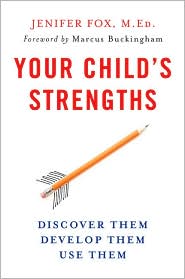 A few days back I wrote an article about how I see the public schooling system failing us. It had much to do with the fact that in general public schools require all students to meet the same cookie cutter standards. Because everyone has to fit a certain mold and be proficient in the exact same things at the exact same levels or beyond they make a HUGE mistake. They are focusing on weaknesses.
A few days back I wrote an article about how I see the public schooling system failing us. It had much to do with the fact that in general public schools require all students to meet the same cookie cutter standards. Because everyone has to fit a certain mold and be proficient in the exact same things at the exact same levels or beyond they make a HUGE mistake. They are focusing on weaknesses.
Your child may be excellent at reading and writing. Perhaps they can write beautiful poems or decipher some of Shakespeare’s deeper passages. They truly master the language arts. BUT instead of focusing on those strengths that child is pulled from those activities and interests to devote more time and energy to what their teachers consider their “weak” area….perhaps math. That was me. My son is the flip side of the coin. His strengths are mathematical, mechanic, and artistic. He struggles in reading and writing though, so his teachers spend monumental amounts of time (his and theirs) trying to “fix” this deficiency.
Well, I read a book recently that takes on this problem and calls it not so much an issue of where your child goes to school but a problem of a personal nature for children and their  parents. The effort towards societal change and a re-valuation of our inborn strengths begins at a personal level. We ALL need to see that it does no one any good, individually or in a global sense to focus on our weaknesses instead of our strengths. We NEED to help our children find their strengths.
parents. The effort towards societal change and a re-valuation of our inborn strengths begins at a personal level. We ALL need to see that it does no one any good, individually or in a global sense to focus on our weaknesses instead of our strengths. We NEED to help our children find their strengths.
The book is Your Child’s Strengths – Discover Them, Develop Them, Use Them by Jenifer Fox.
I really liked this book because I feel that an education should not be about test scores, getting into the right college, or job training. It should be a discipline and a life. A journey to find out who we were, how we fit into the world and what we can bring to it. We want to bring our best so it makes sense that we would want to find our strengths and nurture them at every turn. If we focus on our weaknesses and split our focus like that, we will be only half what we could be.
Fox defines weakness as a feeling of depletion, a constant draining of energy.
Weakness personified is a persistent and cunning thief, creeping into your life and the lives of your children masked as hope and constantly nagging, “Look at me, fix me, improve me, and then you will be happy.”
She asserts that focusing on your weakness translates into a weak life and we need to focus on the opposing quality…strength. Our children can discover their strengths with our encouragement, nurturing, and sustained approval. In the first chapters of the book Fox shows us how we may be unwittingly sending our children disapproving messages and inadvertently focusing on, and causing them to focus on, their weaknesses.
Beyond that, Fox says that we must change what we teach, how we teach, and the outcomes we expect from children. Amen to that!
We foster weakness when we force children to sit all day long absorbing content for which they will never have any use, then chastise them for not showing any interest.
If they don’t see the value and practical application they won’t retain the information making for a monumental waste of time and energy. But 20 years from now they may get the opportunity to go on the Are you Smarter Than a 5th Grader TV show and get trounced, not because they are stupid, but because their minds are programmed to forget the relatively useless factoids they don’t need to live and work.
The book then goes on to explain how we discover our Activity Strengths, Relationship Strengths, and Learning Strengths and those of our children. The fact that we all have unique strengths in all of these areas is exactly why standardized schooling is so bass ackwards. Fox shares many personal stories from her own life and her dealings with teachers and students and how she used certain techniques to draw out their particular strengths and their awareness of them. That leads to the last half of the book which is full of workbook exercises that parents, teachers and children can use to discover and develop their strengths.
This is a truly valuable book for teachers and parents…FULL of “aha” moments. Ms. Fox has been working within schools for 25 years and her insight and experience in this area is wonderfully valuable. It is also important to mention that this book is for public schoolers AND homeschoolers….this book is beneficial for both.

